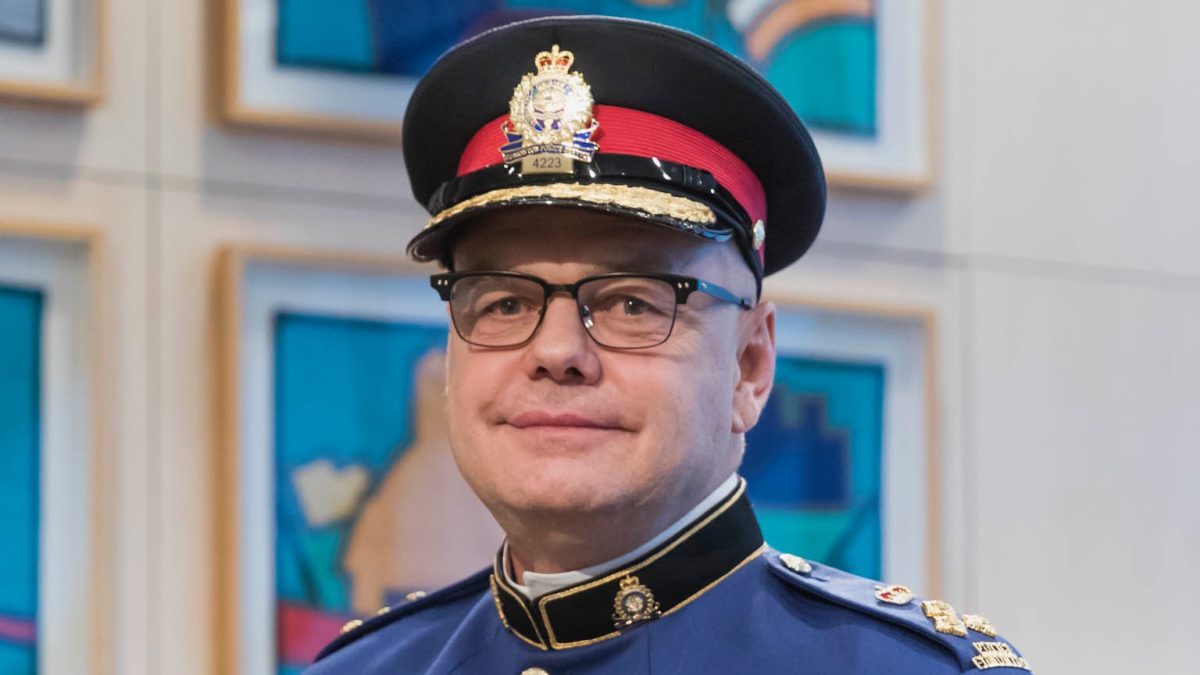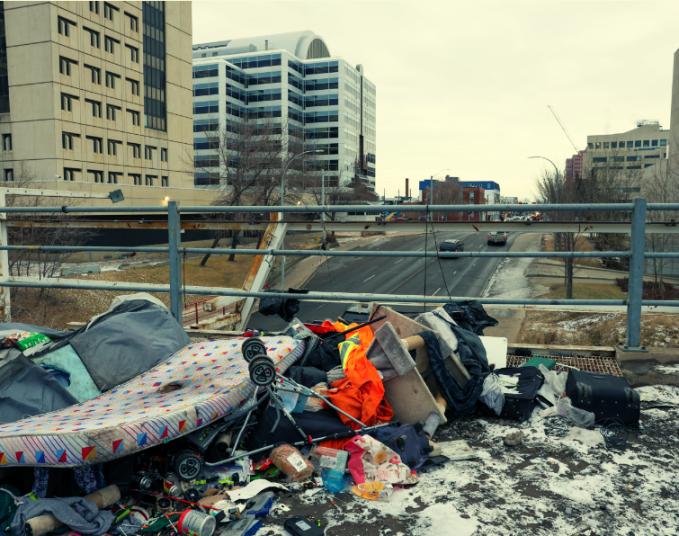Empathy and accountability — put those two elements together, and society can have effective law enforcement.
Outgoing Edmonton Police Service Chief Dale McFee repeatedly uses those two words during our interview. Through his eyes, the police need to have empathy for those who are victims — from those who need social services, or to get clean. But at the same time, he thinks Canadians need to be a lot tougher on those at the top of the chains — on those who distribute the drugs, and in his words, “pull the trigger.”
In just a few days, McFee will leave the Edmonton Police Service after six years at the helm. He will become the province’s deputy minister of executive council and head of the Alberta Public Service.
He believes that EPS is in a much better place in 2025 than it was when he took over in 2019.
“I honestly feel pretty good about where we are,” McFee says via a Zoom call from his nearly cleaned-out office. “Simple leadership is about leaving the team or the organization a little better off than when you found it. I certainly think we can say that.”
And why is that exactly? Crime is down this past year, and it’s at one of the lowest rates of the past decade. Shootings are down nearly 50 per cent. And McFee points to the rise in community engagement and proactive policing — he believes that reduction in crime is not on the police alone, but on the City as a whole.
In terms of leaving the organization in a better state than when he got there, McFee feels the EPS is “deeper” than it was before. In 2019, the Edmonton Police Commission tasked McFee with designing a “succession plan,” a way that the force could become more diverse and better able to deal with change. So, experts were brought in from non-police backgrounds — economists, epidemiologists, mathematicians — to add insight and analysis to the work that the police were doing. We’re seeing a lot more of this in society as a whole, from doctors who work with engineers, to city planners who work with data analysts.
“We operate at a wholly different level, now,” says McFee. “And I don’t take credit for it. I think it’s a credit to the whole organization… If you can’t look at new ways of looking at problems, there’s a good chance you’re going to continue to spin your wheels.”
He says that data analytics helped in the controversial taking down of encampments, and understanding there’s an intersection of many issues. “If you get the question right, you have a better chance of getting the answer right,” he says, sort of echoing a very famous literary statement from The Hitchhiker’s Guide to the Galaxy.
“You have three distinct groups that are showing there,” he says of the encampment takedowns. “First of all, you have to get around the issues that are longstanding — real-time ID, connection to services, connection to social insurance, can some of them get home?
“But, when you break down the issues, you’ve got people who have serious issues like drug psychosis, mental health, addictions. It’s all happening in a real unstable environment. That’s where compassion and health-led programming needs to be in place. And then you look in the middle, that recovery system, if you can do an intervention, whether it’s employment, whether it’s treatment, whether it’s stabilization, whether it’s housing, whether it’s mental health, it’s a lot cheaper and it stops them from going to the next phase.”
And the third thing is the lack of housing, which McFee feels has become even more strained thanks to increased immigration without an affordable-housing strategy that’s designed to give newcomers places to live.
“If you look at some of our low-income housing, and you talk to some of the providers on that, it’s almost 100 per cent immigration. It’s not that immigration’s not a good thing. It’s a great thing. It’s how our country was built. But the way immigration is now, without a plan for people coming over, it shows you that you have three different things that are percolating, and the only way to tackle this is to tackle all three of them at the same time.”
And that means boosting the recovery systems, aiding in health intervention and allowing the private sector to build more low-cost housing and cutting down on red tape.
Despite McFee’s talk about solving our social ills, there’s no doubt that there’s been some tension between City Hall and the police; from the taking down of encampments, to pay raises for officers. And, in January, EPS requested a review of the appointment of two civilians to the Edmonton Police Commission, as both Dan Jones and Renée Vaugeois were both outspoken critics of the current police regime. Jones has since withdrawn from the Commission.
McFee believes that the “defund the police” movement is failing across North America, but admits the relationship between EPS and City Council “could be better.”
“I would urge people to understand that the police have to do what they have to do, regardless of politics, to keep their communities safe,” says McFee. “When it came to taking down encampments, some of our elected officials were in the protests, but people were dying and were burning to death. Keeping people outside in the weather we just went through, it doesn’t make sense. If you look at the university protests, we took criticism for that. But when you’re asked by the folks who are in charge of the property that they want people removed, police have a job to do, and our job is to do it safely as we can.”
He believes his successor will “need to pay attention to the geopolitics.” And that means being invested in what’s happening internationally, nationally and locally.
Nationally and internationally, his successor will need to pay close attention to the border issues. While they’ve become inflamed since Donald Trump took office in the United States, McFee says there are some longstanding issues that threaten law and order.
“The whole border discussion, well, we’ve been saying our border’s been a problem for 15 years,” says McFee. “Guns have flowed north. Drugs are flowing. It doesn’t matter if Mexico is worse than us, it’s still an issue. Our stolen autos are going to foreign countries, they go through the ports. A lot of this stuff needs to be paid attention to — there needs to be good policy around this.
“And the drugs go south, too. I’m not sure why people don’t think they’re going south. Just look at the fact that we’ve taken four major fentanyl super labs down in the last 10 months. Canada is a place where our accountability is a lot less stringent than other countries… Canada is an exporter of fentanyl. Can we say it’s all going to the U.S.? No. Do we know that the U.S. has better intelligence than us? Yes. The reality is that it’s flowing both ways. Absolutely.”
Savvy AF. Blunt AF. Edmonton AF.




